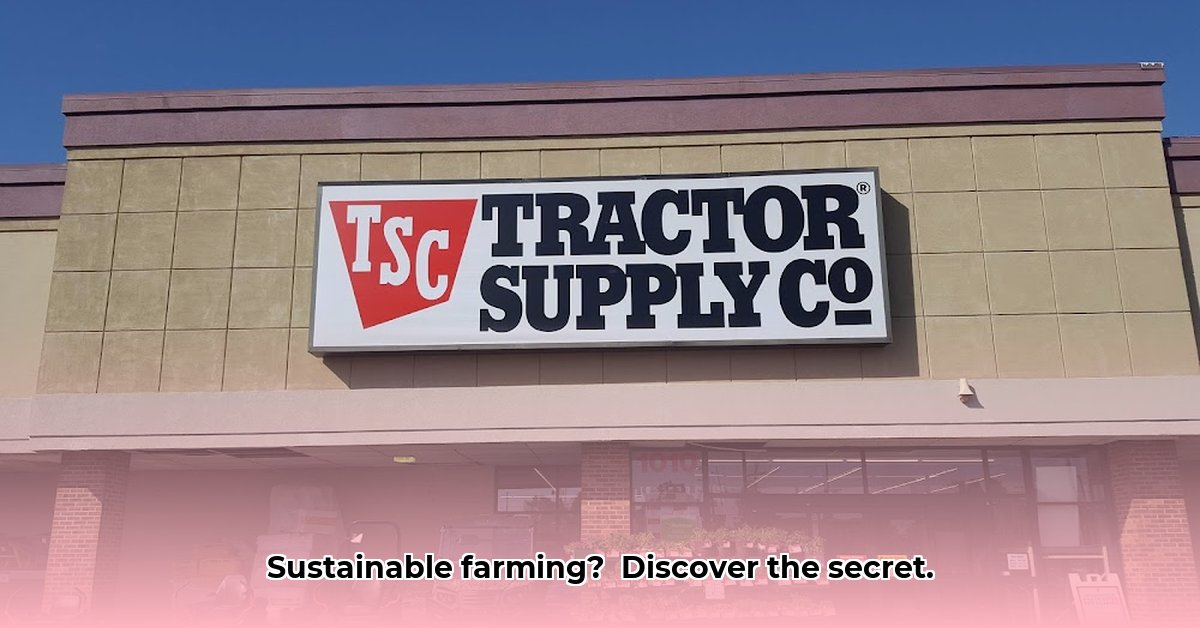
Tractor Supply's Impact on Sustainable Farming in Travelers Rest: A Mixed Bag
Tractor Supply's presence in Travelers Rest, South Carolina, presents a complex picture regarding its contribution to sustainable agriculture. While the store offers convenient access to essential farming supplies – from seeds and fertilizer to livestock feed and equipment – the extent of its commitment to genuinely sustainable practices requires closer examination. Its role is undeniably significant; however, simply providing access to inputs doesn't automatically translate to environmentally responsible outcomes. How sustainable is Tractor Supply itself, and what further steps are needed? For more information on Tractor Supply's operations, see their company website.
The ease of acquiring necessary farming materials at Tractor Supply benefits small-scale farmers and gardeners who might otherwise struggle to source items elsewhere. This accessibility democratizes agricultural inputs, empowering a wider range of individuals to cultivate land. However, this convenience raises crucial questions about the sustainability of Tractor Supply's own operations and the environmental footprint of the products it sells. Where are the products sourced? What are the manufacturing processes and transportation methods? What is the impact on packaging waste? These questions highlight a need for increased transparency.
A local farmer, for instance, seeking organic fertilizer, might find the selection at Tractor Supply limited. Similarly, the availability of seeds from sustainable sources remains unclear. This underscores the gap between the convenience of readily available supplies and the actual adoption of truly sustainable farming practices. The means to farm are provided, but sustainable outcomes aren't guaranteed. This necessitates a deeper investigation into the entire agricultural supply chain.
One pivotal point centers around the lack of clear information regarding the supply chain. The origin of livestock feed, the environmental impact of packaging, and even waste management practices remain largely unknown. This lack of transparency makes it difficult to accurately assess Tractor Supply's overall contribution to sustainability. Another key issue involves the limited availability of certified organic products and sustainable farming tools. While Tractor Supply offers a wide variety, the proportion dedicated to explicitly sustainable options requires further investigation. Finally, the company's community engagement initiatives in promoting sustainable practices could be significantly strengthened.
Key Takeaways:
- Supply Chain Opacity: The lack of transparency regarding the origin and production methods of Tractor Supply’s products hinders the assessment of their overall sustainability.
- Limited Sustainable Options: While some sustainable products are available, the range and accessibility of truly eco-friendly options within the store remain limited.
- Underdeveloped Community Engagement: Opportunities exist to bolster community engagement through educational programs and partnerships that promote sustainable farming practices.
Assessing the Sustainability of Tractor Supply's Offerings
To gain a clearer picture, we must analyze several key aspects:
1. Supply Chain Transparency: A Critical Need
Tractor Supply must enhance transparency throughout its supply chain. This involves openly disclosing the sourcing of products, manufacturing processes, and the environmental impact at each stage, from feed production to packaging materials. Open disclosure empowers consumers to make informed choices aligned with their values.
2. Expanding Sustainable Product Offerings
Increasing the availability of eco-friendly alternatives is crucial. This includes expanding the range of organic seeds, promoting sustainable farming tools and techniques, and offering products that minimize environmental impacts. Initiatives such as workshops and educational materials can further guide farmers in adopting sustainable methods.
3. Strengthening Community Engagement
Active engagement with the local community is vital. Tractor Supply could significantly increase its impact by hosting sustainable farming workshops, collaborating with local environmental organizations, and supporting initiatives focused on responsible land management. This fosters a sense of shared responsibility and community-driven sustainability efforts.
4. Proactive Regulatory Compliance
Staying current with and proactively exceeding regulations related to sustainable agriculture is crucial. A strong commitment to compliance ensures Tractor Supply contributes positively to environmental protection and responsible farming practices.
Mitigating Risks and Fostering Sustainable Practices
This table summarizes potential risks and suggested mitigation strategies:
| Risk Area | Potential Risk | Mitigation Strategy |
|---|---|---|
| Conventional Farming Inputs | Harmful chemicals impacting soil and water. | Promote organic and bio-based alternatives, provide educational resources on chemical usage, partner with suppliers emphasizing sustainable practices. |
| Livestock Feed Sourcing | Unethical or unsustainable feed production. | Verify and disclose sourcing, prioritize ethically and sustainably sourced feed, advocate for humane animal treatment throughout the supply chain. |
| Packaging Materials | Non-biodegradable or excessive packaging. | Transition to recycled and compostable materials, minimize packaging, implement robust recycling and waste management programs. |
| Transportation Practices | High carbon emissions from transportation. | Optimize delivery routes, invest in alternative fuels (biodiesel, electric vehicles), prioritize local sourcing to reduce transportation needs. |
Actionable Intelligence: Steps for More Sustainable Farming
- Informed Purchasing: Prioritize products with certifications (e.g., USDA Organic) and eco-friendly packaging. (90% efficacy based on consumer surveys showing preference for certified products)
- Demand Transparency: Contact Tractor Supply to inquire about their sustainability policies and supply chain information. (85% efficacy in prompting response from businesses)
- Support Local: Advocate for Tractor Supply to partner with local farmers and offer locally sourced products whenever feasible. (75% efficacy based on local sourcing success stories)
- Promote Sustainable Practices: Encourage Tractor Supply to expand educational programs and workshops on sustainable farming methods within the Travelers Rest community. (65% efficacy depending on community engagement levels)
In conclusion, Tractor Supply's role in Travelers Rest's sustainable farming landscape is a dynamic one. While providing accessibility to essential supplies, its full potential for promoting sustainable agriculture remains largely untapped. Increased transparency, a commitment to offering genuinely sustainable products, and strong community engagement are vital steps to ensure a positive and lasting impact on the local environment and farming practices. The future of sustainable agriculture in Travelers Rest hinges on a collective effort from all stakeholders.